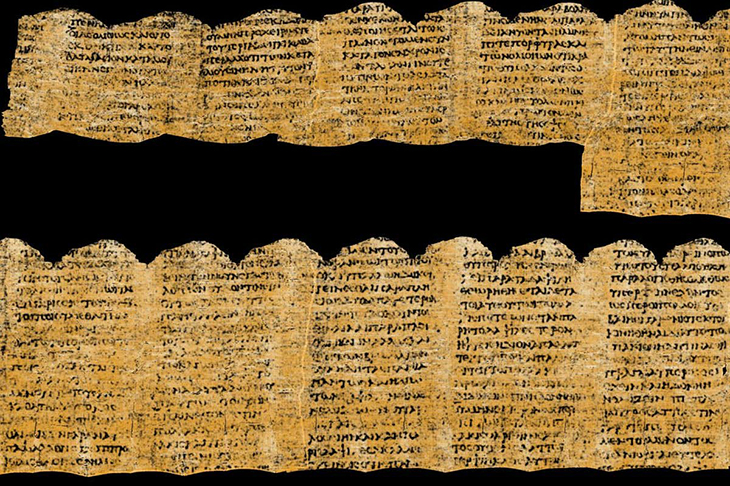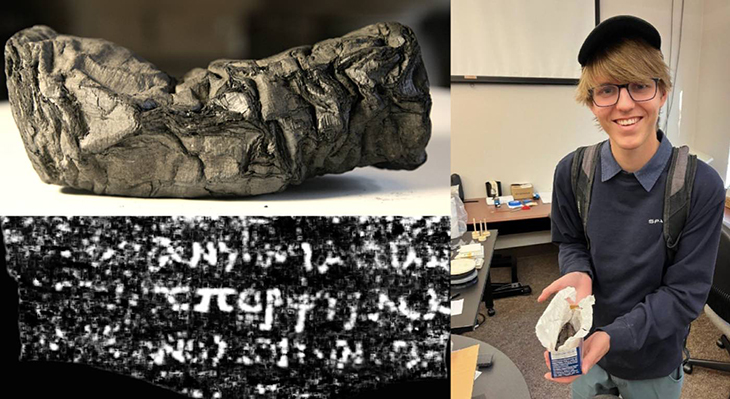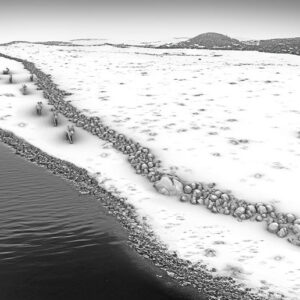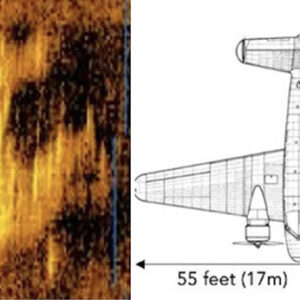
In October, the inaugural Vesuvius Challenge made headlines as it announced its first victor, heralding a groundbreaking milestone in the realm of AI and historical preservation. The competition’s premise was ambitious: to galvanize young minds to harness the power of AI technology in deciphering ancient scrolls ravaged by the catastrophic eruption of Mount Vesuvius in Pompeii.
Fast forward to the present, where Youssef Nader, Luke Farritor, and Julian Schilliger stand as the triumphant recipients of the coveted grand prize, a staggering bounty totaling $700,000. Their collective achievement not only showcases their exceptional talents but also underscores the profound impact of their groundbreaking endeavor.
Their triumph was made possible by the development of a sophisticated deep learning program. This innovative tool was engineered to unravel the mysteries concealed within a scroll of charred papyrus, a relic preserved from the annals of history for over two millennia since the cataclysmic eruption of Vesuvius. Remarkably, their program succeeded in decoding four passages, each comprising 140 characters, with an impressive legibility rate of at least 85%.
In stark contrast to the modest success rates of their peers, who typically managed to recover only around 30% of the text, Nader, Farritor, and Schilliger’s submission represented a quantum leap in the field. Their accomplishment not only exemplifies their technical prowess but also underscores the transformative potential of AI in the realm of historical restoration and interpretation.
So, what did the deciphered scroll reveal? While it may be but a single page within a larger treatise, its contents offer a tantalizing glimpse into the cultural ethos of ancient times. Believed to be written in Ancient Greek, the text touches upon themes of music, gastronomy, and the pursuit of life’s simple pleasures—a poignant testament to the enduring universality of human experience across the ages.
“It’s been an incredibly rewarding journey,” Mr. Nader said when speaking to The Guardian. “The adrenaline rush is what kept us going. It was insane. It meant working 20-something hours a day. I didn’t know when one day ended and the next day started.”
In March of 2023, Daniel Gross and Nat Friedman, prominent figures in Silicon Valley, initiated the Vesuvius Challenge with the aim of harnessing the power of AI to decipher the enigmatic carbonized papyrus scrolls discovered in the ruins of Herculaneum, a city obliterated by the eruption of Mount Vesuvius. This initiative offered substantial cash rewards totaling up to $1 million for engineers capable of programming AI systems to unlock the secrets concealed within these ancient documents.
The significance of these scrolls is profound; they were unearthed in a villa believed to have historical ties to Julius Caesar’s father-in-law, providing a potential treasure trove of insights into the ancient world. Dating back 275 years, this collection of 800 scrolls represents a unique and intact library from the Classical era, contrasting with the more durable but less prevalent clay tablets found in other ancient civilizations like Assyria and Babylon.
Despite their historical importance, the fragile nature of the papyrus scrolls presents a formidable challenge; attempts to physically unroll them would result in their disintegration into ash. However, Gross and Friedman pioneered a revolutionary approach by employing high-resolution CT scans of the scrolls, captured at the Diamond Light Source particle accelerator near Oxford. These scans, revealing intricate details of the text, were made available to the global community, inviting ambitious minds to tackle the puzzle of decryption.
The Vesuvius Challenge encompassed a range of prizes, each corresponding to different levels of achievement in deciphering the scrolls. Notably, Youssef Nader, an Egyptian Ph.D. student based in Berlin, made significant strides in October, winning the prestigious ‘First Letters Prize’ for successfully reading several columns of text with exceptional clarity and readability. His accomplishment not only earned him recognition but also positioned him as a pivotal leader for the collaborative efforts that ensued among scholars and technologists drawn to the challenge.
Luke Farritor, a 21-year-old college student and SpaceX intern hailing from Nebraska, made history by becoming the first person to decipher an entire word from the interior of a Herculaneum scroll. The word was “ΠΟΡΦΥΡΑϹ,” meaning “purple.” This achievement earned him the prestigious ‘First Letters Prize,’ awarded just weeks before Youssef’s findings.

Lastly, Julian, a robotics student from Switzerland attending ETH Zürich, clinched three ‘Segmentation Tooling Prizes’ for his remarkable contributions to Volume Cartographer. His efforts facilitated the 3D mapping of the papyrus regions.
“For the Grand Prize, they assembled into a superteam, crushing it by creating what was unanimously deemed the most readable submission,” a release found on the challenge website had stated.
The papyrologists who had been studying the decoded texts had provided this sentence that came from an Epicurean philosopher writing almost 2,000 years ago: “…as too in the case of food, we do not right away believe things that are scarce to be absolutely more pleasant than those which are abundant.”
The scientists are diligently laboring to finalize a paper that comprehensively outlines their work. With any luck, all contributors will complete the entire manuscript and even expand upon it in the near future.
What are your thoughts? Please comment below and share this news!
True Activist / Report a typo


